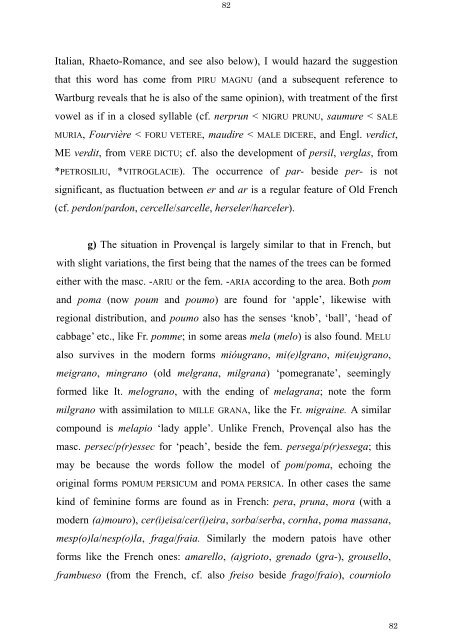The Latin Neuter Plurals in Romance - Page ON
The Latin Neuter Plurals in Romance - Page ON
The Latin Neuter Plurals in Romance - Page ON
Create successful ePaper yourself
Turn your PDF publications into a flip-book with our unique Google optimized e-Paper software.
82<br />
Italian, Rhaeto-<strong>Romance</strong>, and see also below), I would hazard the suggestion<br />
that this word has come from PIRU MAGNU (and a subsequent reference to<br />
Wartburg reveals that he is also of the same op<strong>in</strong>ion), with treatment of the first<br />
vowel as if <strong>in</strong> a closed syllable (cf. nerprun < NIGRU PRUNU, saumure < SALE<br />
MURIA, Fourvière < FORU VETERE, maudire < MALE DICERE, and Engl. verdict,<br />
ME verdit, from VERE DICTU; cf. also the development of persil, verglas, from<br />
*PETROSILIU, *VITROGLACIE). <strong>The</strong> occurrence of par- beside per- is not<br />
significant, as fluctuation between er and ar is a regular feature of Old French<br />
(cf. perdon/pardon, cercelle/sarcelle, herseler/harceler).<br />
g) <strong>The</strong> situation <strong>in</strong> Provençal is largely similar to that <strong>in</strong> French, but<br />
with slight variations, the first be<strong>in</strong>g that the names of the trees can be formed<br />
either with the masc. -ARIU or the fem. -ARIA accord<strong>in</strong>g to the area. Both pom<br />
and poma (now poum and poumo) are found for ‘apple’, likewise with<br />
regional distribution, and poumo also has the senses ‘knob’, ‘ball’, ‘head of<br />
cabbage’ etc., like Fr. pomme; <strong>in</strong> some areas mela (melo) is also found. MELU<br />
also survives <strong>in</strong> the modern forms mióugrano, mi(e)lgrano, mi(eu)grano,<br />
meigrano, m<strong>in</strong>grano (old melgrana, milgrana) ‘pomegranate’, seem<strong>in</strong>gly<br />
formed like It. melograno, with the end<strong>in</strong>g of melagrana; note the form<br />
milgrano with assimilation to MILLE GRANA, like the Fr. migra<strong>in</strong>e. A similar<br />
compound is melapio ‘lady apple’. Unlike French, Provençal also has the<br />
masc. persec/p(r)essec for ‘peach’, beside the fem. persega/p(r)essega; this<br />
may be because the words follow the model of pom/poma, echo<strong>in</strong>g the<br />
orig<strong>in</strong>al forms POMUM PERSICUM and POMA PERSICA. In other cases the same<br />
k<strong>in</strong>d of fem<strong>in</strong><strong>in</strong>e forms are found as <strong>in</strong> French: pera, pruna, mora (with a<br />
modern (a)mouro), cer(i)eisa/cer(i)eira, sorba/serba, cornha, poma massana,<br />
mesp(o)la/nesp(o)la, fraga/fraia. Similarly the modern patois have other<br />
forms like the French ones: amarello, (a)grioto, grenado (gra-), grousello,<br />
frambueso (from the French, cf. also freiso beside frago/fraio), courniolo<br />
82









